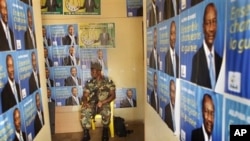The United Nations says further delay in Guinea's presidential election could destabilize the region. The heads of U.N. peacekeeping missions across West Africa issued a joint appeal for the swift conclusion of Guinea's return to civilian rule. The second round of voting has been postponed twice and prospects for a vote on October 10 are slipping quickly.
There are problems distributing voting material. The leading candidate in the run-off, former prime minister Cellou Diallo, also objects to the new head of the electoral commission, who he says favors electoral rival Alpha Conde.
U.N. Secretary-General Ban Ki-moon's special representative in West Africa Said Djinit says the U.N. appealed to the leaders of Guinea, and the two candidates in particular, to do all they can to overcome the current difficulties surrounding the leadership of the election commission and to create conditions under which the country can quickly organize the second round of presidential voting in peace and security. He says the aim is to have elections that are accepted by everyone and enable Guinea to begin a new era of democracy and economic and political reconstruction.
West Africa is largely peaceful now, and the United Nations wants to keep it that way. Voters in Ivory Coast hope to go to the polls next month for a much-delayed presidential vote. Liberia and Nigeria hold presidential elections next year and Sierra Leone the following year. It is a busy electoral schedule for West Africa that the U.N. special representatives say could be a factor of instability and a threat to social peace.
"Sierra Leone, as you may know, has a long border with Guinea, and the people of both countries share cultural, ethnic, and various commonalities," said Berhanemeskel Nega, the U.N. deputy special representative for Sierra Leone. "And anything which happens in Guinea, affects directly Sierra Leone positively or negatively. So we are watching all these developments."
Diallo's campaign says electoral rules must be respected and further delay could threaten outside investment in Guinea. Conde's campaign says problems from the first round must be corrected before voters can have confidence in the results of a second round.
Djinnit says it is a process complicated by Guinea's poor political history.
He adds that it is a long process because Guinea has been in crisis since its independence 50 years ago. It has never had a democratic, multi-party election before this one.
Acting military ruler General Sekouba Konate is trying to return Guinea to civilian rule nearly two years after a military coup. General Konate has repeatedly reaffirmed his support for the electoral process, but even he appears to be losing patience, telling French radio that, if necessary, he will install a civilian in charge of the country by force.
UN: Guinea Vote Delay Could Destabilize West Africa








